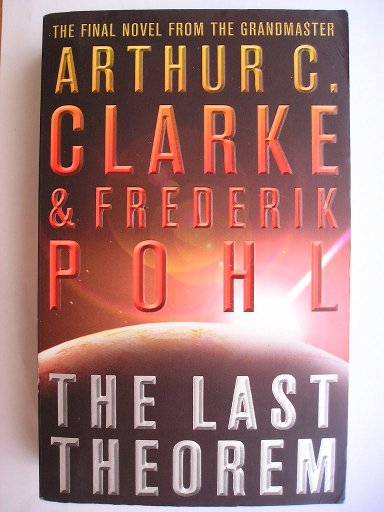
The novel “The Last Theorem” by Arthur C. Clarke and Frederik Pohl was published for the first time in 2008.
The nuclear explosions occurred on Earth over the decades have sent in space energy waves that years later reach areas of space inhabited by sentient species. The most powerful of those species decides that humans are too warlike and that measures must be taken against them. Eventually, a space fleet is launched towards the Earth to sterilize it.
Ranjit Subramanian is a young student who wants to become a mathematician. His obsession is the famous Fermat’s Last Theorem: in 1995, mathematician Andrew Wiles published a 150-page proof of it, however, that used mathematical techniques developed well after Fermat’s death and Ranjit wants to prove the theorem using only mathematical techniques available at Fermat’s time. Involved in the assault to a ship, Ranjit is mistaken for one of the pirates. Despite being imprisoned and tortured, in his mind he analyzes Fermat’s last theorem until he finds the solution.
Arthur C. Clarke started working on “The Last Theorem” in 2004 but in the last years of his life his health deteriorated so he was no longer able to continue. Eventually it was Frederik Pohl who wrote most of the novel and he tells about its development until its conclusion, arrived a few days before Clarke’s death.
In one of the preambles, Frederik Pohl writes that “The Last Theorem” is basically Ranjit Subramanian’s story and this is its biggest problem. In the first part of the novel the plot concerning the aliens is almost marginal and if it weren’t for their decision to exterminate all human beings it would be irrelevant.
More or less the first three quarters of “The Last Theorem” are focused on Ranjit Subramanian. At the beginning, he’s a student gifted in mathematics who at school has to study other subjects and some are boring. This section dwells so much that it seems that the authors want the readers to feel some of that boredom.
Another problem related to Ranjit’s plot is that there’s very little science fiction and when there is it’s added in a rather shallow way, almost casual. “The Last Theorem” contains many elements already seen even repeatedly in previous stories especially by Arthur C. Clarke but occasionally by Frederik Pohl too, starting with the space elevator.
Ranjit’s plot is mostly about mathematics and particularly Fermat’s last theorem, which doesn’t have a direct connection with the plot concerning the aliens. For readers who are unfamiliar with mathematics, many parts of “The Last Theorem” can be a dull read. Of course, if you can’t count to 1,023 using your fingers you can learn how to do it and a few mathematical tricks but I understand that for many people a good part of the novel can be boring.
The last quarter of “The Last Theorem” is in my opinion much better and more interesting. When the aliens finally reach the Earth the real action starts. The pace, which before was slow except for a few occasional episodes in Ranjit’s life, greatly accelerates.
Previously, the information provided by the authors about the aliens were little, after their arrival on Earth they provide a little more but in my opinion not enough. Various species are involved in the expedition to Earth and there are also many others, each with their own physical and mental characteristics, their culture and technology. Potentially, there was a lot to develop but it didn’t go that way. On the other hand, even the human characters aren’t particularly developed and sometimes the tone of Ranjit’s story looks fable-like.
In my opinion, “The Last Theorem” would’ve been much better if Ranjit’s story had been cut heavily and the one concerning the aliens had been more developed instead. There were also many elements concerning international politics that could be developed, instead they’re present in a rather superficial way, just enough to serve the plot.
Unfortunately, when “The Last Theorem” has finally become interesting it simply ends and quite abruptly. Probably Frederik Pohl didn’t want to make other additions and changes after the last time Arthur C. Clarke read it before dying but I think he should’ve at least developed the ending better.
Criticizing two great masters of science fiction so much is unpleasant but “The Last Theorem” has several flaws. As it is, I think the last part makes it passable but reading it makes sense for fans of the two authors and mathematics lovers.


Permalink